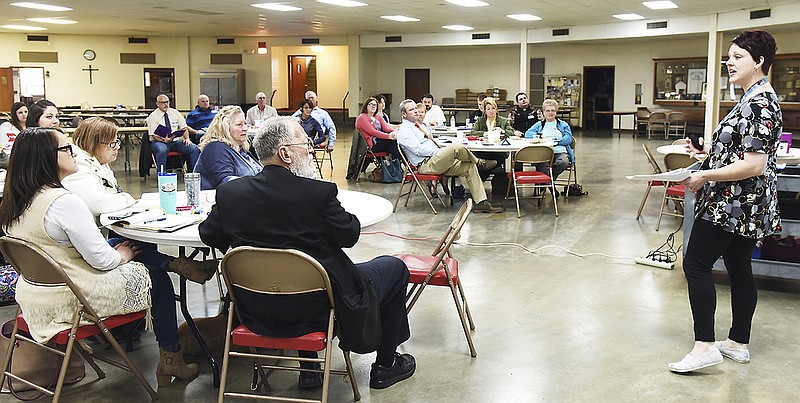About 40 adults attended a Mental Health First Aid for Youth program Thursday at St. Joseph Cathedral in Jefferson City.
Compass Prevention conducted the training, which was shortened from a 12-hour program. Staff covered topics that included depression, anxiety, psychosis, substance abuse, self-harm, suicide and other issues.
Challenges, session leaders said, were overcoming the stigma associated with mental illness or being able to distinguish between teen angst and depression.
Adolescence is a dramatic change teenagers go through, prevention coordinator Laura Powell said.
Deacons, ministers, teachers, principals, library employees and other adults who commonly come in contact with youths attended the eight-hour session.
"You're going to be that first contact person where professional assistance isn't available," Melissa Hildebrand with Compass Prevention, said. "We're not here to learn how to diagnose. We're not here to be the professional, although we may act in a professional role."
It's difficult to fight through the stigma associated with mental health and mental health concerns, she told listeners.
Parents often don't understand their teenager may be struggling with depression or another disorder, Julie Gramlich said. Gramlich, Cathedral of St. Joseph parish youth minister and founder of the Anne Marie Project, said parents think their children may simply need to "grow up" or mature. The project is an adult coalition helping young people learn to cope with stress and make good decisions.
"No, he's struggling with depression," Gramlich said. "No, he's struggling with something else."
Realizing there is something else affecting the child is difficult, she said.
As part of the training, speakers showed recordings of Kevin Hines talking about his struggle with mental illness and his eventual suicide attempt.
Hines discussed his decline into depression.
"I was so depressed," Hines said. "I remember going into the bathroom by myself, looking in the mirror. I would loathe everything I saw."
The night before the San Francisco Bay-area resident attempted suicide, he found a website about people jumping from the Golden Gate Bridge. That site, he said, claimed if a person jumps off the Golden Gate Bridge, they will die on impact. "Good luck!" it concluded.
The next morning, his father came into his room and told Hines he was worried about him. His father asked Hines to go to work with him that day.
"He should have asked me, 'Are you suicidal?'" Hines said.
Hines might not have told his father at first, but would have if his father was persistent, he said. Hines wanted to tell somebody. And once he admitted to being suicidal, he should have been asked if he had a plan.
"My father never asked me that question, to no fault of his own," Hines said.
Later that day in September 2000, Hines jumped from the Golden Gate Bridge. He is one of about three dozen people to survive a leap from the bridge.
People considering suicide or who think someone is considering suicide should call the National Suicide Prevention Lifeline at 1-800-273-8255. The call is free and confidential.
Bob Leake, a deacon at St. Joseph's Catholic Church in Palmyra, said information he took from the training will help him identify youth in crisis.
"Some of the signs are consistent with teen behavior," Leake said. "They gave us the tools to ask the right questions. If you don't know what you're looking for, you might miss it."

